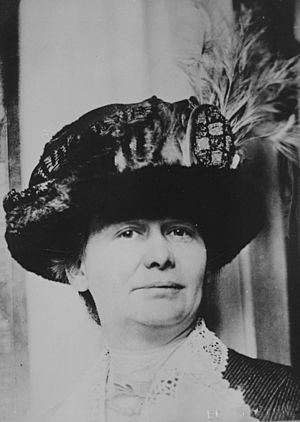Charlotte Anita Whitney facts for kids
Quick facts for kids
Charlotte Anita Whitney
|
|
|---|---|

Charlotte Anita Whitney in the 1910s
|
|
| Born | July 7, 1867 San Francisco, California, U.S.
|
| Died | February 4, 1955 (aged 87) San Francisco, California, U.S.
|
| Resting place | Mountain View Cemetery (Oakland, California) |
| Nationality | American |
| Education | Wellesley College |
Charlotte Anita Whitney (born July 7, 1867 – died February 4, 1955) was an important American activist. People often called her "Anita Whitney." She worked hard for women's rights, helped women get the right to vote, and was involved in early Communist Party groups in California.
She is well-known for a famous court case in 1920, called Whitney v. California. In this case, the U.S. Supreme Court discussed the idea of "clear and present danger." This means that free speech should only be limited if it causes an immediate and serious threat. This idea became very important for protecting people's right to speak freely.
Contents
Early Life and Education
Anita Whitney was born in San Francisco, California, on July 7, 1867. Her family was very well-known. Her relatives included Stephen Johnson Field, a Supreme Court Justice, and Cyrus W. Field, a very rich businessman. Her father was a lawyer.
Growing Up in California
Anita went to both private and public schools in Oakland, California. After finishing school in Oakland, she attended a special school in San Jose, California to become a teacher.
Later, she moved to the East Coast to study at Wellesley College. She graduated from Wellesley in 1889. After college, she worked as a teacher for a while.
Discovering Social Work
In 1893, Anita visited a poor neighborhood in New York City. This experience deeply affected her. She soon became very interested in social work, which is helping people in need.
In 1901, she became the executive secretary for the United Charities of Oakland, California. She worked in this role until 1908, helping many people in her community.
Fighting for Women's Rights
Anita Whitney was also a strong supporter of women's suffrage, which was the movement to give women the right to vote. She believed that women should have the same rights as men.
Campaigning for the Vote
Long before women across the entire United States could vote, Anita was actively involved in campaigns. She worked on voting rights efforts in many places, from California to Connecticut.
By 1911, her interest in women's rights led her to become an organizer for the College Equal Suffrage League in California. She held this position until 1913. Later, she served as the Vice President of the National American Woman Suffrage Association.
Later Life and Activism
Even after her famous court case in 1920, Anita Whitney continued her political work. She faced challenges but kept fighting for what she believed in.
Running for Office
In 1924, while still dealing with legal issues from her 1919 arrest, Anita ran for California State Controller. She campaigned very hard and received over 100,000 votes.
On June 20, 1927, the Governor of California, C. C. Young, gave Anita a full pardon. He felt it was wrong to put her in jail. The Governor believed that the law she was convicted under was fair, but the situation during her trial was unusual. He thought the case would not have been brought forward under normal circumstances.
Continuing Her Work
In 1934, Anita helped start the San Francisco Workers' School. This school later became known as the California Labor School.
In 1936, Anita Whitney was named the national chairwoman of the Communist Party. This showed her strong standing among activists.
California's Communist groups nominated Anita to run for the United States Senate two times. Her popularity among activists remained strong. Even though she faced political challenges, her campaign for senator in 1950 still received nearly 99,000 votes.
Death
Anita Whitney passed away on February 4, 1955, in San Francisco. She was 87 years old.
 | Precious Adams |
 | Lauren Anderson |
 | Janet Collins |

